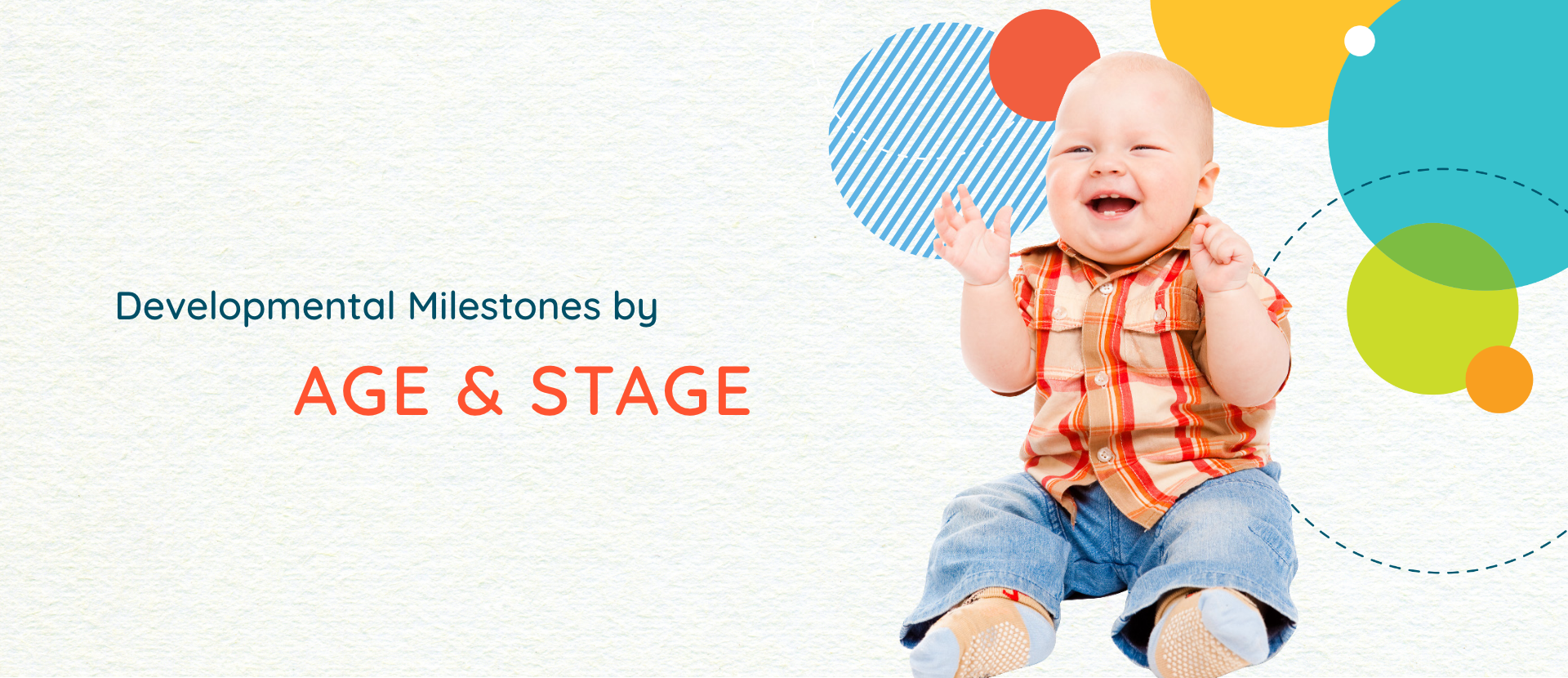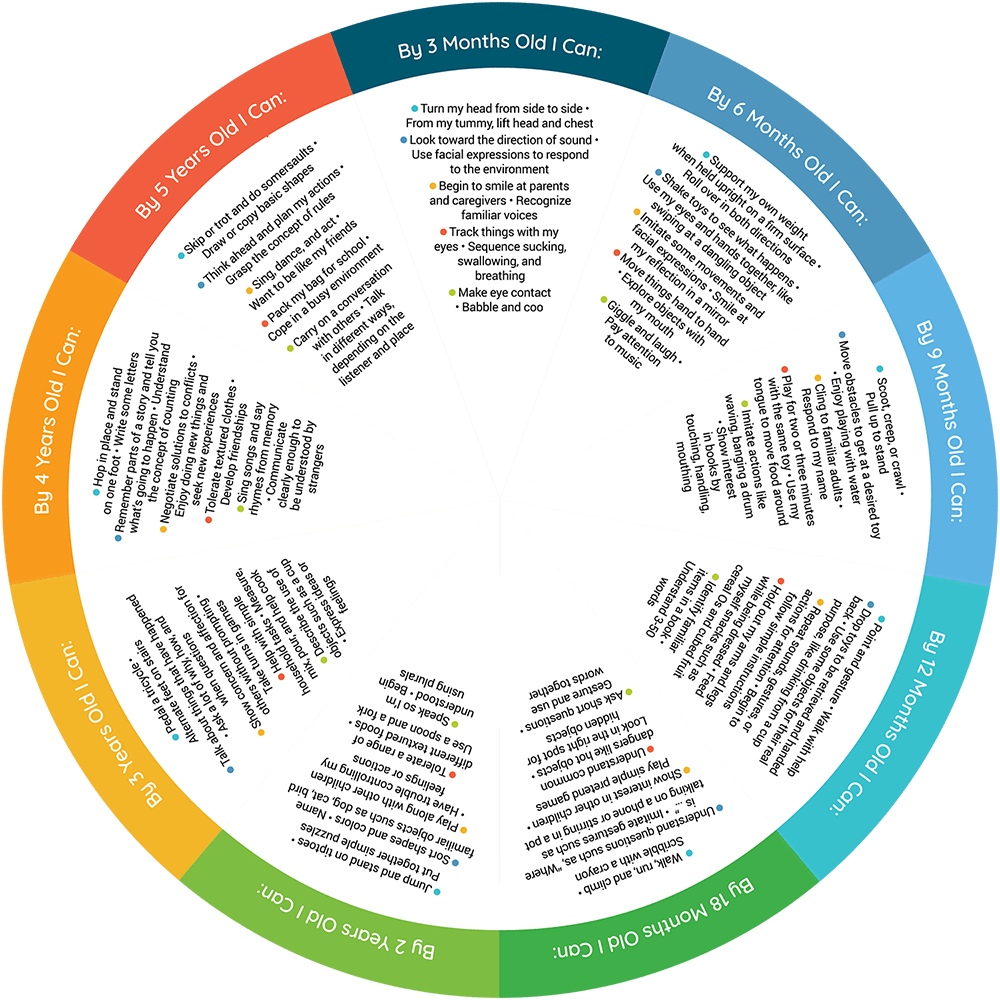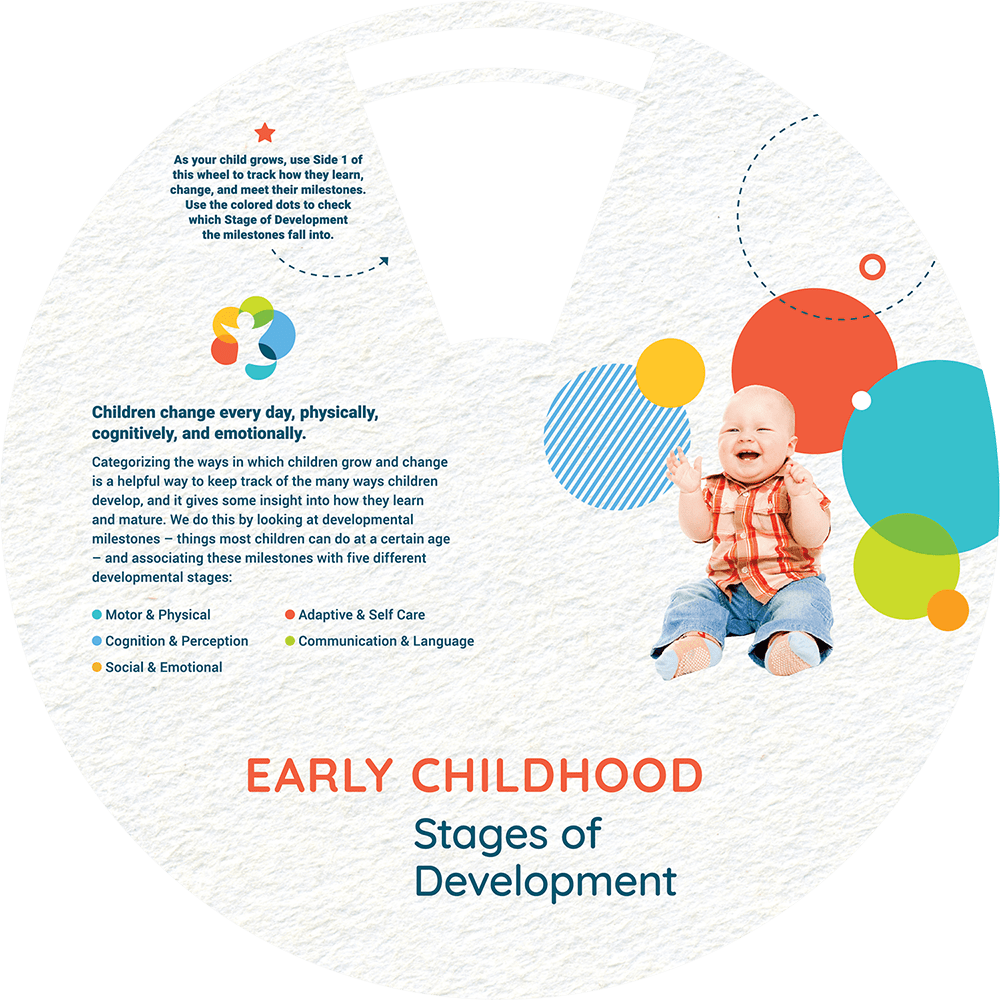
Children change every day, physically, cognitively, and emotionally.
Categorizing the ways in which children grow and change is a helpful way to keep track of the many ways children develop, and it gives some insight into how they learn and mature. We do this by looking at developmental milestones – things most children can do at a certain age – and associating these milestones with five different developmental stages:
- Motor & Physical
- Cognition & Perception
- Social & Emotional
- Adaptive & Self Care
- Communication & Language
Milestones are things most children can do at a certain age. To help keep track of the ways children develop, milestones are related to different developmental stages. This wheel helps you check on your child’s milestones in each Stage of Development at different ages.
Click on the wheel to see the different milestones!


- Turn my head from side to side - From my tummy, lift head and chest
- Look toward the direction of sound - Use facial expressions to respond to the environment
- Begin to smile at parents and caregivers - Recognize familiar voices
- Track things with my eyes - Sequence sucking, swallowing, and breathing
- Make eye contact - Babble and coo
- Support my own weight when help upright on a firm surface – Roll over in both directions
- Shake toys to see what happens – Use my eyes and hands together, like swiping at a dangling object
- Imitate some movements and facial expressions – Smile at my reflection in a mirror
- Move things hand to hand – Explore objects with my mouth
- Giggle and laugh – Pay attention to music
- Scoot, creep, or crawl – Pull up to stand
- Move obstacles to get at a desired toy – Enjoy playing with water
- Cling to familiar adults – Respond to my name
- Play for two or three minutes with the same toy – Use my tongue to move food around
- Imitate actions like waving, banging a drum - Show interest in books by touching, handling, mouthing
- Point and gesture – Walk with help
- Drop toys to be retrieved and handed back – Use some objects for their real purpose, like drinking from a cup
- Repeat sounds, gestures, or actions for attention – Begin to follow simple instructions
- Hold out my arms and legs while being dresses – Feed myself snacks such as cereal Os and cubed fruit
- Identify familiar items in a book – Understand 3-50 words
- Walk, run, and climb – Scribble with a crayon
- Understand questions such as “Where is…” – Imitate gestures such as talking on a phone or stirring in a pot
- Show interest in other children – Play simple pretend games
- Understand common dangers like hot objects – Look in the right spot for hidden objects
- Ask short questions – Gesture and use words together
- Jump and stand on tiptoes – Put together simple puzzles
- Sort shapes and colors – Name familiar objects such as dog, cat, bird
- Play along with other children – Have trouble controlling feelings or actions
- Tolerate a range of different textured foods – Use a spoon and a fork
- Speak so I’m understood – Begin using plurals
- Pedal a tricycle – Alternate feet on stairs
- Talk about things that have happened – Ask a lot of why, how, and when questions
- Show concern and affection for others without prompting – Take turns in games
- Help with simple household tasks – Measure, mix, pour, and help cook
- Describe the use of objects such as a cup – Express ideas or feelings
- Hop in place and stand on one foot – Write some letters
- Remember parts of a story and tell you what’s going to happen – Understand the concept of counting
- Negotiate solutions to conflicts – Enjoy doing new things and seek new experiences
- Tolerate textured clothes – Develop friendships
- Sing songs and say rhymes from memory – Communicate clearly enough to be understood by strangers
- Skip or trot and do somersaults – Draw or copy basic shapes
- Think ahead and plan my actions – Grasp the concept of rules
- Sing, dance, and act – Want to be like my friends
- Pack my bag for school – Cope in a busy environment
- Carry on a conversation with others – Talk in different ways, depending on the listener and place
See developmental activities for different ages!
Learn More About Us!
A campaign from the Wyoming Department of Health, Screen for Success is on a mission to spread the word about the multitude of benefits of early childhood screenings, how screenings lead to healthy children, and why every child in Wyoming should get their free screening.
“We may not be able to prepare the future for our children,
but we can at least prepare our children for the future.”
Franklin D. Roosevelt

Wyoming Department of Health
(307) 777-6972
(307) 777-7515
Screen for Success is for every child and every family in Wyoming, without exception, and without discrimination.

